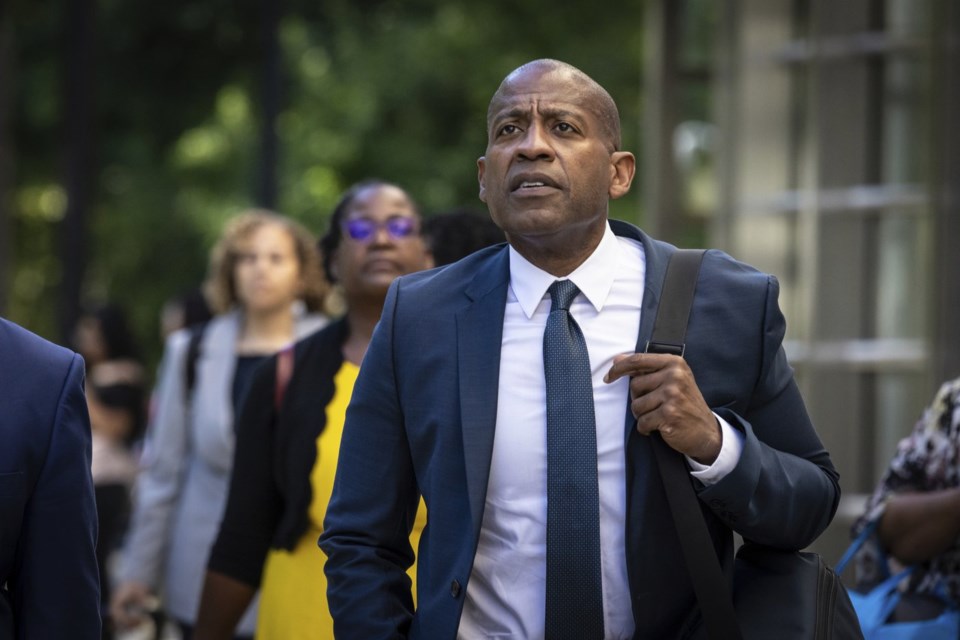NEW YORK (AP) — Former talk show host Carlos Watson was sentenced Monday to nearly 10 years in prison in a federal that cast his once-buzzy Ozy Media as an extreme of fake-it-'til-you-make-it startup culture.
So extreme that another Ozy executive impersonated a YouTube executive to hype Ozy to investment bankers — while Watson coached him, prosecutors said.
Watson, 55, and the now-defunct company last summer of charges including wire fraud conspiracy. He has denied the allegations and plans to appeal.
“I loved what we built with Ozy,” he said in court Monday, initially addressing supporters in the audience before the judge suggested he turn around. Watson told the judge he was a target of “selective prosecution” as a Black entrepreneur in Silicon Valley, where African American executives , and called the case “a modern lynching.”
“I made mistakes. I'm very, very sorry that people are hurt, myself included,” he said, but “I don't think it's fair.”
Watson, who faced a mandatory minimum sentence of two years in prison and potentially as much as 37 years, remains free for now on $3 million bond. He is to surrender to prison in the coming months.
Prosecutors accused the former cable news commentator and host of playing a leading role in a scheme to deceive Ozy investors and lenders by inflating revenue numbers, touting deals and offers that were nonexistent or not finalized, and flashing other false indications of Ozy's success.
Watson even listened in and texted talking points while his co-founder posed as a YouTube executive to praise Ozy on a phone call with potential investors, prosecutors said.
U.S. District Judge Eric Komitee said Monday that the “quantum of dishonesty in this case is exceptional.”
“Your internal apparatus for separating truth from fiction became badly miscalibrated," he told Watson in sentencing him.
During the trial, the defense blamed any misrepresentations on others, particularly co-founder Samir Rao and former Ozy chief of staff Suzee Han. She and Rao pleaded guilty, are awaiting sentencing and testified against Watson.
Watson portrayed himself as a founder who put everything he had into his company, saying that he took an average salary around $51,000 from Ozy in its final years, has triple-mortgaged his home and drives a 15-year-old car.
Ozy, founded in 2012, was styled as a hub of news and culture for millennials with a global outlook.
Watson boasted an impressive resume: degrees from Harvard University and Stanford Law School, a stint on Wall Street, on-air gigs at CNN and MSNBC, and entrepreneurial chops. Ozy Media was his second startup, coming a decade after he sold a test-prep company that he had founded while in his 20s.
Mountain View, California-based Ozy produced TV shows, newsletters, podcasts, and a . Watson hosted several of the TV programs, including the Emmy-winning “Black Women OWN the Conversation,” which appeared on the Oprah Winfrey Network.
Ozy snagged big advertisers, clients and grants. But beneath the outward signs of success was an overextended company that struggled — and dissembled — to stay afloat after 2017, according to insiders' testimony.
The company strained to make payroll, ran late on rent and took out pricey cash advances to pay bills, former finance vice president Janeen Poutre told jurors. Meanwhile, Ozy gave prospective investors much bigger revenue numbers than those it reported to accountants, according to testimony and documents.
in July, Watson said the company's cash squeezes were just a startup norm and its investors knew they were getting unaudited numbers that could change.
One of those investors was his sister Beverly Watson, who stands by her brother and told the court Monday that her biggest loss was “this important platform that elevated people and ideas that weren't being heard before.”
The judge noted that another investor, however, wrote to the court to say that Carlos Watson had misused his trust.
Ozy , after a New York Times column disclosed the phone-call impersonation gambit and raised questions about the true size of the startup's audience.
Jennifer Peltz, The Associated Press



